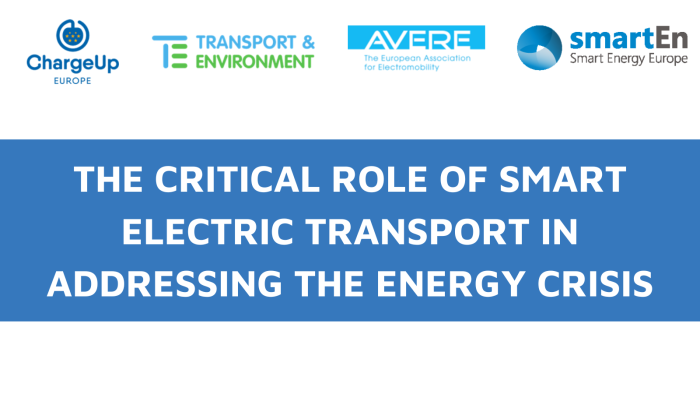Europe is going through its worst energy crisis since the 1970s. All levers must be activated to minimize its impact on European households and companies. We, the undersigned associations active in the e-mobility and wider energy ecosystem believe that demand-side flexibility measures are currently under-leveraged in the EU’s response. The smart electrification of road transport can and should play a critical role in support of electricity demand reduction, energy independence, and the integration of more renewable electricity into power grids thanks to the activation of demand-side flexibility.

Europe is going through its worst energy crisis since the 1970s. All levers must be activated to minimize its impact on European households and companies.
We, the undersigned associations active in the e-mobility and wider energy ecosystem, believe that demand-side flexibility measures are currently under-leveraged in the EU’s response. The smart electrification of road transport can and should play a critical role in support of electricity demand reduction, energy independence, and the integration of more renewable electricity into power grids thanks to the activation of demand-side flexibility.
Approaching this holistically is a major opportunity for Europe, from geopolitical, economic and climate perspectives. Smart electrification of transport will unlock the integration of higher shares of renewables into the grid by syncing charging demand with the amount of renewable electricity in the power grid. This in turn is enhancing the EU’s energy independence and resilience. Being able to shift EV charging to off-peak hours, or when there is excess (renewable) supply will help consumers save significantly on their energy bills. In addition, smart EV charging helps optimally use existing power grids, which reduces costs for society overall.
As Europe further develops its response to the energy crisis, we therefore call for:
– More renewables to be added to the grid to further decarbonise road transport thereby achieving greater emissions reductions in a sector that is still a major contributor to Europe’s greenhouse gas emissions and fossil fuel dependency;
– Allocating part of the revenues from the Solidarity Contributions envisaged by the European Commission to be reinvested in renewable generation, smart EV charging infrastructure and user-centric services, programmes mobilising demand side flexibility and energy efficiency measures. This will allow relief measures for hard-hit households and companies to be deployed while keeping the twin green and digital transitions on track and supporting Europe’s resilience amidst heightened geopolitical tensions;
– Developing measures to fully exploit the benefits of smart and bi-directional charging and demand-side flexibility, including by households: smart charging solutions support the integration of renewable energy in the system, help manage electricity demand reduction and empower consumers to help lower emissions through energy balancing, flexibility, and storage
No stone should be left unturned to overcome the energy crisis. We are ready to work with EU and national officials and regulators to deploy the highlighted solutions at pace.

